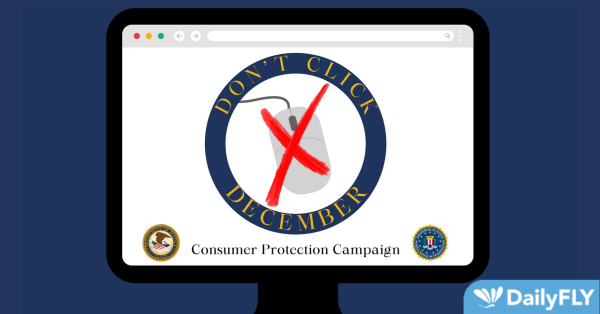Agencies Warn About the “Package Can’t Be Delivered” Scam
BOISE – During the holiday season, online criminals increasingly target Idahoans through online scams and fraud schemes. Today, U.S. Attorney Josh Hurwit, along with the FBI, the Idaho State Police, the Ada County Prosecutor’s Office, the Ada County Sheriff’s Office, the Boise Police Department, the Meridian Police Department, and the Garden City Police Department, released a second PSA as part of their joint “Don’t Click December” Consumer Protection Campaign. The Canyon County Sheriff’s Office, Idaho Attorney General’s Consumer Protection Division, AARP Idaho, and the Better Business Bureau also participated in the announcement.
The campaign advises members of the public to exercise skepticism and caution when receiving unsolicited online, email, pop-up, or text communications from unknown or unverified sources. If there is any doubt about a link, message, or attachment, law enforcement cautions: “don’t click it.”
In the second PSA, available here, Garden City Police Chief Cory Stambaugh, Boise Police Chief Ron Winegar, and U.S. Attorney Hurwit warn the public about the “Package can’t be delivered” scam and explain some of the ways in which individuals can protect themselves.
This scam targets individuals through text messages or emails, claiming a package cannot be delivered unless they click the provided link and enter personal information or pay a redelivery fee. Often the scammer wants you to click a link to steal your money and information. Don’t click it. Instead, contact the delivery service or seller directly using a verified number or website.
As part of the ongoing campaign, two additional PSAs are planned to be released in the weeks leading up to Christmas in an effort to alert the public to other common online fraud schemes that Idaho law enforcement has seen affect Idahoans.
Unfortunately, these are not the only schemes affecting the public, and new schemes arise all the time. Law enforcement hopes that the “Don’t Click December” Consumer Protection Campaign will raise public awareness and encourage individuals to talk to their friends and relatives about not clicking suspicious links, texts, messages, pop-ups, or attachments.
“We have witnessed many Idahoans lose their hard-earned money or their entire retirement savings to online scams. And, sadly, this type of crime tends to spike during the holiday season,” said U.S. Attorney Hurwit. “But, together, we can reduce the risks by talking with each other about how to avoid such scams, and I’m grateful to our law enforcement partners and the AARP for joining us in the Don’t Click December campaign. We also encourage Idahoans to report any scams as soon as possible so that law enforcement can investigate and we can bring these vicious online criminals to justice.”
“Our detectives see the devastating impact scams like these have on members of our community every day. It can happen to anyone,” said Boise Police Chief Ron Winegar. “By working with our partners to talk about scams and point out the red flags, we hope to not only prevent you and your loved ones from becoming victims but to also create an environment where those who have fallen victim to a scammer feel comfortable reporting.”
The U.S. Attorney’s Office and its law enforcement partners recognize that we all must work to eliminate the stigma individuals may experience if they are victimized. There is no shame to falling victim to an online scheme, which are often designed by professional criminals, sophisticated, and tested repeatedly across the country.
For this reason, the “Don’t Click December” Consumer Protection Campaign also publicizes ways to report scams and incidents of fraud to the FBI and local law enforcement.
To learn more about these and other scams targeting Americans visit FBI.gov, and if you believe you are the victim of a scam, take action by reporting it to FBI’s Internet Crime Complaint Center at IC3.gov or by contacting your local law enforcement agency.
